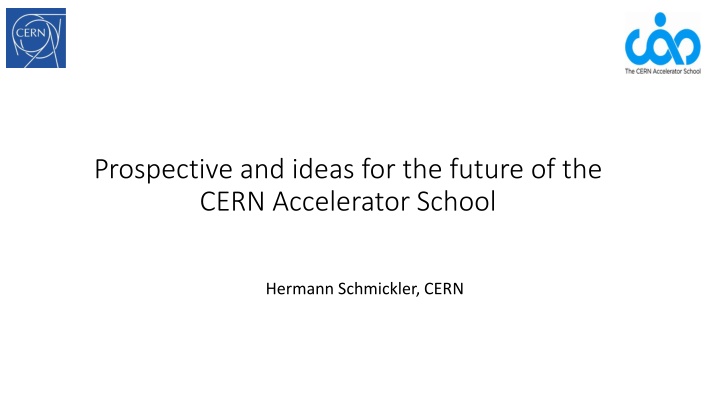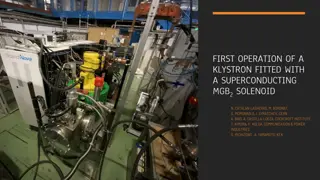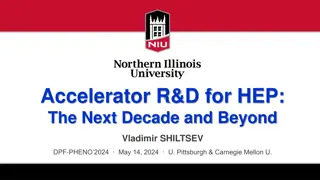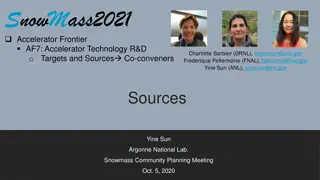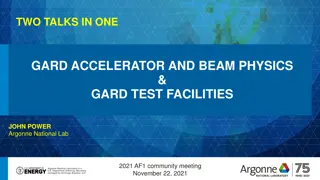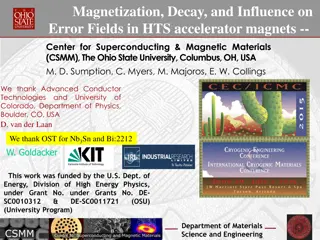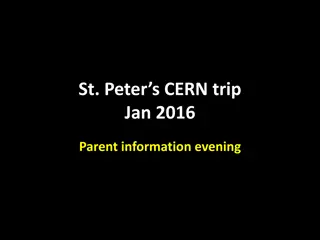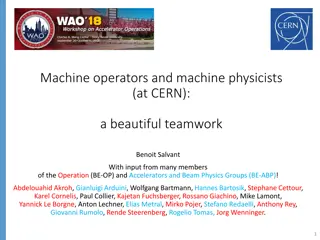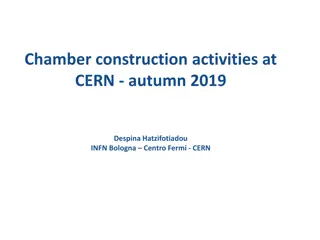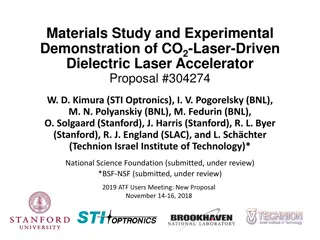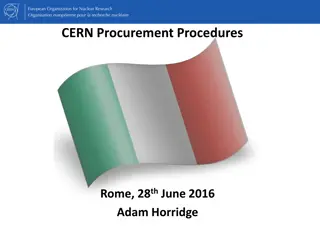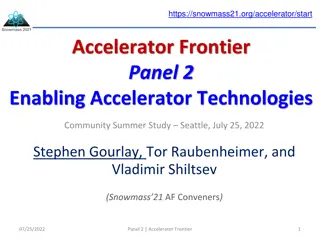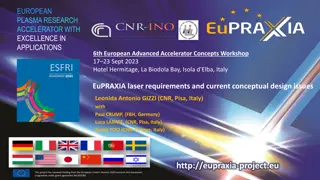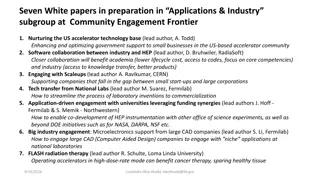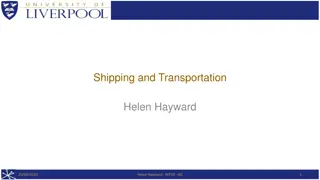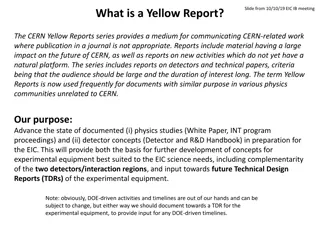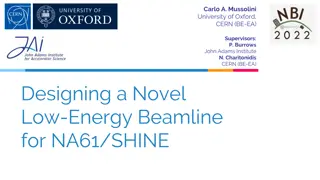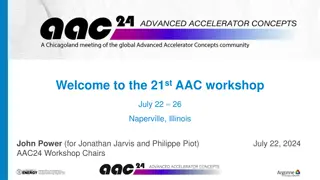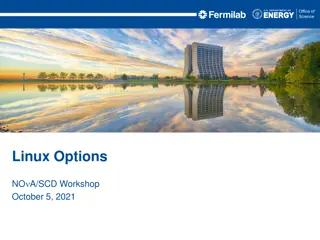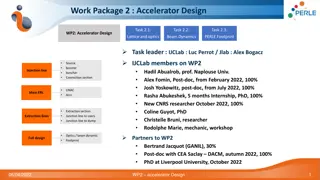Future Prospects and Evolving Ideas for the CERN Accelerator School
The CERN Accelerator School is planning upcoming schools and venues, with proposals for its evolution presented. Courses cover various topics across Member States, with a focus on advanced accelerator physics. A future HEP Collider School is also in the pipeline. Suggestions for improvement include enhancing education standards, coherence in teaching, and expanding CAS teachings to university levels.
Download Presentation

Please find below an Image/Link to download the presentation.
The content on the website is provided AS IS for your information and personal use only. It may not be sold, licensed, or shared on other websites without obtaining consent from the author.If you encounter any issues during the download, it is possible that the publisher has removed the file from their server.
You are allowed to download the files provided on this website for personal or commercial use, subject to the condition that they are used lawfully. All files are the property of their respective owners.
The content on the website is provided AS IS for your information and personal use only. It may not be sold, licensed, or shared on other websites without obtaining consent from the author.
E N D
Presentation Transcript
Prospective and ideas for the future of the CERN Accelerator School Hermann Schmickler, CERN
Outline The immediate future planned schools and venues to come Three proposals for CAS evolution Summary 04/11/2016 Hermann Schmickler-CERN 2
The CERN Accelerator School holds courses in all of the Member States of CERN One One 2017 Injection & Extraction Erice, Italy, March Vacuum for Accelerators Max IV, Sweden, June Advanced AP RHUL, UK, September RF technology (JAS) Japan, October 2018 Colliders for HEP Netherlands ?? Beam Instrumentation Helsinki, Finland Introduction to AP Slovakia ?? 2014, Prague, Czech Republic
My personal favourite topical school to come Planned for early spring 2018 Future HEP collider School - some days on general knowledge teaching including physics motivation and description of concepts (FCC-hh, HE-LHC, FCC e+e-, CLIC, ILC) - up to seven days of parallel teaching on A: hadron circular colliders (beam dynamics and SC magnets) B: lepton circular colliders (beam dynamics and SC RF) C: linear colliders (CLIC and ILC concept continuation of the present LC school) 04/11/2016 Hermann Schmickler-CERN 4
Basic topics No revolution foreseen compared to the present state see presentation of W.Herr this workshop Still Three Subjects for possible improvement: 1) tools for better levelling of education standard of students (in particular when coming to the CERN general introductory and advanced school) in: Mathematics, Relativity, Instrumentation, Electronics 2) increasing the coherence of teaching in general accelerator theory confirming the newly defined syllabus and enforcing it 3) carrying the CAS teaching into university teaching in (all) member states point 3 is closely linked to a success in point 2 see later 04/11/2016 Hermann Schmickler-CERN 5
Before we continue: With the present resource allocation made from CERN no significant progress can be made in the next years. So in some sense the continuation of my talk is also a direct proposal and search for collaboration 04/11/2016 Hermann Schmickler-CERN 6
Spread in educational level (1/4) Taken from presentation of W.Herr 04/11/2016 Hermann Schmickler-CERN 7
Spread in educational level (2/4) For a good understanding of the accelerator theory in the introductory school= linear optics, imperfections, first contact with non-linear optics, some collective effects the student needs: - basic mathematics; in particular differential equations, linear algebra, matrix formalism - relativity, 4 vector annotation, - classical electrodynamics - energy conservation in the form of time invariant Hamiltonian For a good understanding of accelerator technologies = different types of accelerators, magnets and their powering, RF structures and their powering, beam instrumentation, vacuum the student needs in addition: - basic knowledge in electronics - basic knowledge in mechanical engineering - some thermodynamics when it comes to vacuum and cryogenics 04/11/2016 Hermann Schmickler-CERN 8
Spread in educational level (3/4) Teaching for 15 years now in the CAS I observe: - the average knowledge level of the students is almost constant - the spread of knowledge level is continuously increasing Increasing difficulty to propose a school program, which - is not too basic for the average and well prepared students - is not too difficult for the lower tail of the distribution 04/11/2016 Hermann Schmickler-CERN 9
Spread in educational level (4/4) Solutions: 1) Video Recording of the CAS introductory school (done first time this year in Budapest) and making the recordings available on the web. Can be extended to other CERN schools. Beneficial Results to be seen over the next years 2) Self evaluation exercise (15 minutes) on the CAS website on the described subjects and in case of difficulties direct link to e-learning teaching material on these subjects (MOOCs) (MOOC:= Massive Open Online Course) Not yet there: Needs a lot of work 04/11/2016 Hermann Schmickler-CERN 10
Increased Quality of teaching In particular for the teaching of accelerator theory: - Werner Herr has made the effort of compiling a comprehensive syllabus for the courses on accelerator theory . - The syllabus contains naming conventions and detailed instructions for the content of the courses - Presently the CAS relies on its teachers to respect the syllabus only partial success in 2016 04/11/2016 Hermann Schmickler-CERN 11
Increased Quality of teaching Proposed solution: - Select and nominate teachers at least 12 months before next introductory school. Special Care for accelerator theory teaching. - Demand teaching material 6 months before school. In case of no delivery take material from previous school. - Get teachers for a two day event to CERN and reiterate on coherence between material and syllabus. - Reformat partially the teaching material for uniform usage of symbols and for coherence in approach. - Teachers accept to use the reformatted material. 04/11/2016 Hermann Schmickler-CERN 12
Which brings me straight away to the third subject: As soon as the CAS has a uniform teaching material (introductory level) Sort out IP rights with the authors Propose a school (one of this kind) with university professors of the CERN member states as students: - teach to them the whole school - provide them with the uniform teaching material (in English language) - hope they take this to their home institute for a full semester course Such a scheme will not stop the success of the CAS; it will rather prepare future students better and make good publicity for the CAS. 04/11/2016 Hermann Schmickler-CERN 13
But do we need such an effort? 88 institutes from Denmark, Finland, France, Germany, Greece, Italy, the Netherlands, Norway, Poland, Spain, Sweden, Switzerland and the United Kingdom completed the TIARA survey on education and training in accelerator science (2011-2012). Taken from the executive summary: Accelerator science typically represents a small fraction (below 30%) of total formal training time for undergraduate, master s and PhD students, and typically a larger fraction for postdoctoral fellows and staff. There are only a handful of dedicated full-time formal training programmes in accelerator science. 04/11/2016 Hermann Schmickler-CERN 14
Training needs from TIARA report: All categories of accelerator personnel are expected to grow in number, but the increase is proportionally larger for engineers and technicians, which presumably reflects the need for technical staff for construction of the new accelerator projects. 61 research institutes and 43 companies reported on personnel recruitment. The overall annual recruitment rate is approximately 9% for research institutes, and 18% for companies. The majority of institutes and companies reported difficulties in recruiting appropriate personnel; in particular, roughly 70% have difficulty recruiting engineers for accelerator-related work. Skills shortages were reported in a number of key areas. The most critical areas of shortage are in RF systems, beam dynamics, instrumentation and control, and vacuum systems. 68 research institutes and 40 companies reported on personnel training in accelerator science. 94% of research institutes and 75% of companies require training for their personnel. Although most training is provided on-the-job , there is a significant need for training provided by external bodies. The growth of accelerator-based techniques in medicine will require a significant increase in the number of suitably qualified personnel. For example, the number of personnel required to operate hadron therapy facilities is likely to double over the next 5-10 years. 04/11/2016 Hermann Schmickler-CERN 15
Summary Video Courses and MOOCs to equalize entry level to CAS at the level of 2nd year university teaching CAS Accelerator-theory teaching will follow a coherent and modern syllabus Future CAS with university professors as students as initiation for CAS like semester courses at universities? List of upcoming topical schools including FCschool 04/11/2016 Hermann Schmickler-CERN 16
